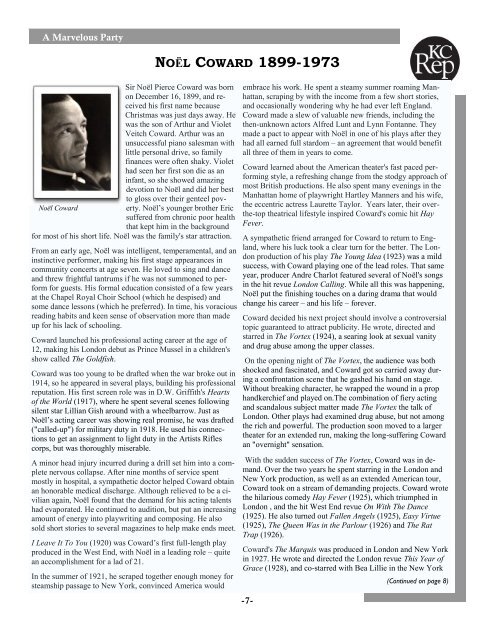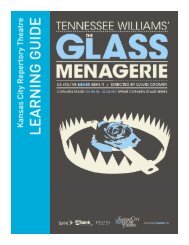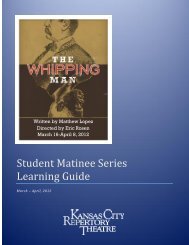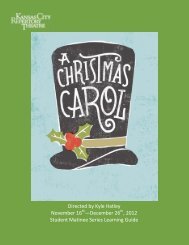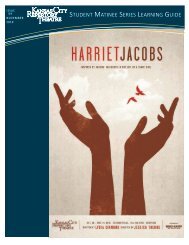A Marvelous Party - The Kansas City Repertory Theatre
A Marvelous Party - The Kansas City Repertory Theatre
A Marvelous Party - The Kansas City Repertory Theatre
Create successful ePaper yourself
Turn your PDF publications into a flip-book with our unique Google optimized e-Paper software.
A <strong>Marvelous</strong> <strong>Party</strong><br />
Sir Noёl Pierce Coward was born<br />
on December 16, 1899, and received<br />
his first name because<br />
Christmas was just days away. He<br />
was the son of Arthur and Violet<br />
Veitch Coward. Arthur was an<br />
unsuccessful piano salesman with<br />
little personal drive, so family<br />
finances were often shaky. Violet<br />
had seen her first son die as an<br />
infant, so she showed amazing<br />
devotion to Noël and did her best<br />
to gloss over their genteel pov-<br />
Noël Coward<br />
erty. Noël’s younger brother Eric<br />
suffered from chronic poor health<br />
that kept him in the background<br />
for most of his short life. Noël was the family's star attraction.<br />
From an early age, Noël was intelligent, temperamental, and an<br />
instinctive performer, making his first stage appearances in<br />
community concerts at age seven. He loved to sing and dance<br />
and threw frightful tantrums if he was not summoned to perform<br />
for guests. His formal education consisted of a few years<br />
at the Chapel Royal Choir School (which he despised) and<br />
some dance lessons (which he preferred). In time, his voracious<br />
reading habits and keen sense of observation more than made<br />
up for his lack of schooling.<br />
Coward launched his professional acting career at the age of<br />
12, making his London debut as Prince Mussel in a children's<br />
show called <strong>The</strong> Goldfish.<br />
Coward was too young to be drafted when the war broke out in<br />
1914, so he appeared in several plays, building his professional<br />
reputation. His first screen role was in D.W. Griffith's Hearts<br />
of the World (1917), where he spent several scenes following<br />
silent star Lillian Gish around with a wheelbarrow. Just as<br />
Noël’s acting career was showing real promise, he was drafted<br />
("called-up") for military duty in 1918. He used his connections<br />
to get an assignment to light duty in the Artists Rifles<br />
corps, but was thoroughly miserable.<br />
A minor head injury incurred during a drill set him into a complete<br />
nervous collapse. After nine months of service spent<br />
mostly in hospital, a sympathetic doctor helped Coward obtain<br />
an honorable medical discharge. Although relieved to be a civilian<br />
again, Noël found that the demand for his acting talents<br />
had evaporated. He continued to audition, but put an increasing<br />
amount of energy into playwriting and composing. He also<br />
sold short stories to several magazines to help make ends meet.<br />
I Leave It To You (1920) was Coward’s first full-length play<br />
produced in the West End, with Noёl in a leading role – quite<br />
an accomplishment for a lad of 21.<br />
In the summer of 1921, he scraped together enough money for<br />
steamship passage to New York, convinced America would<br />
NOËL COWARD 1899-1973<br />
embrace his work. He spent a steamy summer roaming Manhattan,<br />
scraping by with the income from a few short stories,<br />
and occasionally wondering why he had ever left England.<br />
Coward made a slew of valuable new friends, including the<br />
then-unknown actors Alfred Lunt and Lynn Fontanne. <strong>The</strong>y<br />
made a pact to appear with Noёl in one of his plays after they<br />
had all earned full stardom – an agreement that would benefit<br />
all three of them in years to come.<br />
Coward learned about the American theater's fast paced performing<br />
style, a refreshing change from the stodgy approach of<br />
most British productions. He also spent many evenings in the<br />
Manhattan home of playwright Hartley Manners and his wife,<br />
the eccentric actress Laurette Taylor. Years later, their overthe-top<br />
theatrical lifestyle inspired Coward's comic hit Hay<br />
Fever.<br />
A sympathetic friend arranged for Coward to return to England,<br />
where his luck took a clear turn for the better. <strong>The</strong> London<br />
production of his play <strong>The</strong> Young Idea (1923) was a mild<br />
success, with Coward playing one of the lead roles. That same<br />
year, producer Andre Charlot featured several of Noёl's songs<br />
in the hit revue London Calling. While all this was happening,<br />
Noёl put the finishing touches on a daring drama that would<br />
change his career – and his life – forever.<br />
Coward decided his next project should involve a controversial<br />
topic guaranteed to attract publicity. He wrote, directed and<br />
starred in <strong>The</strong> Vortex (1924), a searing look at sexual vanity<br />
and drug abuse among the upper classes.<br />
On the opening night of <strong>The</strong> Vortex, the audience was both<br />
shocked and fascinated, and Coward got so carried away during<br />
a confrontation scene that he gashed his hand on stage.<br />
Without breaking character, he wrapped the wound in a prop<br />
handkerchief and played on.<strong>The</strong> combination of fiery acting<br />
and scandalous subject matter made <strong>The</strong> Vortex the talk of<br />
London. Other plays had examined drug abuse, but not among<br />
the rich and powerful. <strong>The</strong> production soon moved to a larger<br />
theater for an extended run, making the long-suffering Coward<br />
an "overnight" sensation.<br />
With the sudden success of <strong>The</strong> Vortex, Coward was in demand.<br />
Over the two years he spent starring in the London and<br />
New York production, as well as an extended American tour,<br />
Coward took on a stream of demanding projects. Coward wrote<br />
the hilarious comedy Hay Fever (1925), which triumphed in<br />
London , and the hit West End revue On With <strong>The</strong> Dance<br />
(1925). He also turned out Fallen Angels (1925), Easy Virtue<br />
(1925), <strong>The</strong> Queen Was in the Parlour (1926) and <strong>The</strong> Rat<br />
Trap (1926).<br />
Coward's <strong>The</strong> Marquis was produced in London and New York<br />
in 1927. He wrote and directed the London revue This Year of<br />
Grace (1928), and co-starred with Bea Lillie in the New York<br />
-7-<br />
(Continued on page 8)


